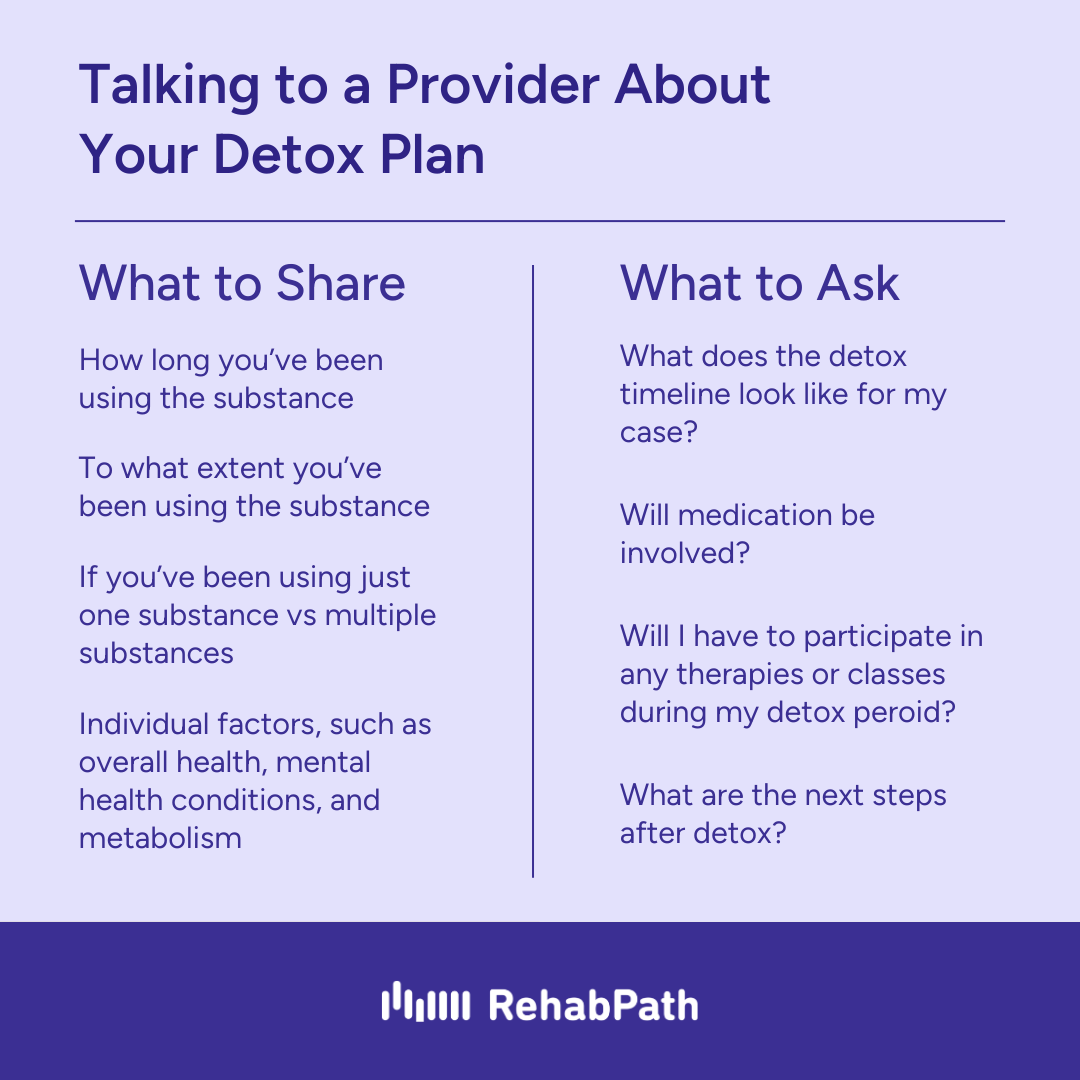Learn / How Long Does It Take to Detox?
How Long Does It Take to Detox?


July 13th, 2023| Clinically Reviewed by
Key Points
- Each person's detox is unique, and each substance has different side effects.
- Detoxing safely under medical guidance is vital.
- Detox is the first step in your recovery journey.
Detox usually lasts at least a couple of days, but many factors can affect how long detox lasts and your side effects. Getting proper care during this sensitive time is vital. Licensed professionals will help you understand how long the detox process is and safely guide you through it.
These days can provide an opportunity to start a healthier life, and detox can help lay the foundation for success. Residential or outpatient treatment can further equip you with necessary skills to maintain sobriety. To begin your journey towards a healthier life, explore the various detox services available.
Factors Affecting Detox Duration
Here are 4 things to consider when talking with a doctor about what your detox process will look like:
- How long you’ve been using the substance
- To what extent you’ve been using the substance
- If you’ve been using just one substance vs multiple substances
- Individual factors, such as overall health, mental health conditions, and metabolism

Detox Timeline for Common Substances
Every substance, and every person, is different, but this is what you can expect to encounter during detox for each substance.
Alcohol
Alcohol detox usually lasts 2 – 10 days1. Symptoms appear within 6 – 24 hours after quitting drinking and are most severe during the 36 – 72 hour period. Symptoms include:
- Anxiety
- Sweating
- Tremors
- Dehydration
- Increased heart rate and blood pressure
- Insomnia
- Nausea and vomiting
Severe withdrawal may involve complications like:
- Seizures
- Hallucinations
- Delirium tremens
- Extreme agitation
Alcohol detox can be life threatening, so doing this with medical care is vital.
Opioids/Heroin
Opioids are drugs such as heroin, opium, morphine, codeine, and methadone. Detox can last 4 – 20 days, depending on the opioid used1. Quick-acting opioids like heroin typically have a shorter duration than long-acting opioids like fentanyl. Withdrawal symptoms usually appear in 8 – 12 hours after quitting. Symptoms include:
- Nausea and vomiting
- Anxiety
- Insomnia
- Hot and cold flashes
- Sweating
- Muscle cramps
- Diarrhea
Opioid withdrawal can be safely worked through as long as you are detoxing with medical supervision.
Benzodiazepines
Benzodiazepines are psychoactive drugs that act as central nervous system depressants. Doctors prescribe them to treat anxiety and sleeping disorders. This drug is relatively easy to become addicted to, so if you are prescribed benzodiazepines, you should use them with caution.
Detox typically lasts 2 – 8 weeks, depending on the benzodiazepine. Quick acting benzodiazepines, like oxazepam, have a shorter detox period1, while clonazepam and other long acting ones have longer detox periods. Symptoms include:
- Anxiety
- Insomnia
- Restlessness
- Agitation
- Poor concentration and memory
- Muscle pains
Benzodiazepine withdrawal could be fatal, so it’s important to taper off these with guidance from medical professionals.
Meth/Stimulants
Stimulants are drugs such as methamphetamine, amphetamine, and cocaine. Detox usually lasts 3 – 5 days1, and symptoms begin within 24 hours of quitting. Symptoms include:
- Agitation and irritability
- Depression
- Increased sleeping and appetite
- Muscle aches
Particularly those who use methamphetamine can develop hallucinations, paranoia, or depressed thoughts during detox.
Meth and stimulant withdrawal can be safely worked through as long as you detox with medical support.
Barbiturates
Barbiturates are depressant drugs prescribed for sleep aid, muscle spasms, anxiety relief, and seizure prevention. Detox usually lasts around 2 weeks, and symptoms appear 2 – 4 days after stopping the medication2. Symptoms include:
- Anxiety
- Restlessness
- Insomnia
- Rhythmic intention tremor (a rhythmic and intense tremor during certain movements3)
- Dizziness
- Seizures
- Psychosis
Barbiturate detox can be life-threatening, so it’s vital to do so under medical supervision.
Marijuana
Marijuana detox typically lasts 1 – 2 weeks1, and the symptoms are relatively mild compared to other detoxification processes. However, this can still be an uncomfortable experience. Symptoms include:
- Anxiety
- Feelings of fear or dissociation
- Restlessness
- Irritability
- Poor appetite
- Disturbed sleep
- Gastrointestinal upsets
- Night sweats
- Tremors
Marijuana withdrawal can be safely worked through as long as you detox with medical supervision.
Your Unique Experience Detoxing
Taking all of this into account, detox duration and experience can vary from person to person.
The detox process can negatively affect your co-occurring disorder(s)4 or vice versa. This could apply to medical disorders or mental disorders. Agitation, depression, or hallucinations can appear during detox, so if your mental health issues include these, they may be heightened during this process.
Be sure to tell your doctor about any medical conditions you have. It’s very important that they take these into account when deciding what medication to give you, your tapering timeline, etc.
Medical Detox vs. Other Forms of Detox
Detox is a broad term, and the general definition is to rid the body of toxic things. When we hear “detox,” we may first think of using dandelion tea to cleanse our bodies, or holistically-based cellular detox.
Medical detox, what we’ve been covering in this article, involves ridding the body of drugs or alcohol under the supervision of licensed medical professionals. Often, this involves using medication to assist the detoxification, like methadone and diazepam.
Coming off of any substance could have negative or life threatening effects, so this process shouldn’t be taken lightly. Your detox beyond dandelion tea needs to be medically monitored for your own safety and well being.
Detoxing Safely With Professional Guidance
Substance detox is a complicated process that requires professional guidance 24/71. Doctors can help you safely rid yourself of the substance. You could risk harming yourself if you detox without proper care. You might also relapse without the guidance of a doctor. Having professionals there helps make this uncomfortable experience as comfortable as possible.
Post-Detox Transition and Treatment
Detox is a great start to recovery, but most of the time people will relapse if that’s the only care they receive1. The next part of your journey can include attending a residential or outpatient program to build your recovery toolkit with essential coping skills. In fact, SAMHSA emphasizes this as their 3rd pillar of detoxification5. These 3 components are
- Evaluation: testing how substance use has affected your body and creating a plan
- Stabilization: medically assisted detox to get you to a stable, substance-free state
- Fostering the patient’s entry into treatment: emphasizing the importance that you follow through with a substance abuse program to maintain your sobriety
During detox, you usually won’t participate in talk therapy because you’re in a susceptible, healing state. The real work and self growth comes after detox. During residential or outpatient care, you’ll work in individual and group therapy sessions using a variety of methods, including cognitive behavioral therapy (CBT). CBT is a highly effective treatment for addiction6. This is because it targets the thoughts, feelings, and behavior patterns that are common in substance use disorder.
You can build a support network with your therapists, peers, and family. You’ll learn to identify the early warning signs of relapse. You can even participate in relapse prevention groups. And in treatment, you’ll have more time to solidify your new coping skills.
Addiction is more than just using substances, and recovery is more than just detoxing from those substances. It’s impacted your perspective and how you think. Treatment can guide you back to a better place by shifting how you view yourself, your surroundings, and your future.
A Step Forward You can try your best to plan for what your detox may look like, but the bottom line is that there are a lot of variables. Detoxing safely with medical professionals ensures that the bumps along the road during this process can be molehills instead of mountains. Explore where your new journey will take you by starting with detox.
-
Withdrawal management. (2009). World Health Organization. https://www.ncbi.nlm.nih.gov/books/NBK310652/
-
Sarrecchia, C., Sordillo, P., Conte, G., & Rocchi, G. (1998). [Barbiturate withdrawal syndrome: A case associated with the abuse of a headache medication]. Annali Italiani Di Medicina Interna: Organo Ufficiale Della Societa Italiana Di Medicina Interna, 13(4), 237–239. https://pubmed.ncbi.nlm.nih.gov/10349206/
-
Rocha Cabrero, F., & De Jesus, O. (2023). Intention tremor. In StatPearls. StatPearls Publishing. http://www.ncbi.nlm.nih.gov/books/NBK560642/
-
5 co-occurring medical and psychiatric conditions. (2006). Substance Abuse and Mental Health Services Administration (US). https://www.ncbi.nlm.nih.gov/books/NBK64105/
-
1 overview, essential concepts, and definitions in detoxification. (2006). Substance Abuse and Mental Health Services Administration (US). https://www.ncbi.nlm.nih.gov/books/NBK64119/
-
McHugh, R. K., Hearon, B. A., & Otto, M. W. (2010). Cognitive behavioral therapy for substance use disorders. Psychiatric Clinics of North America, 33(3), 511–525. https://doi.org/10.1016/j.psc.2010.04.012
Return to Resource Library
Our Promise
How Is RehabPath Different?
We believe everyone deserves access to accurate, unbiased information about mental health and addiction. That’s why we have a comprehensive set of treatment providers and don't charge for inclusion. Any center that meets our criteria can list for free. We do not and have never accepted fees for referring someone to a particular center. Providers who advertise with us must be verified by our Research Team and we clearly mark their status as advertisers.








